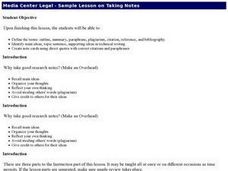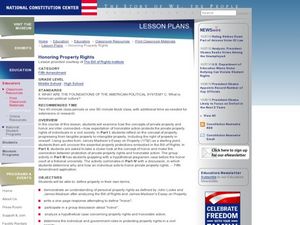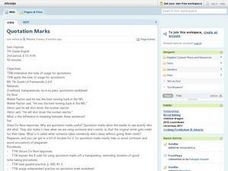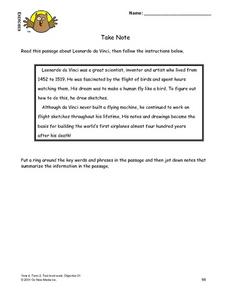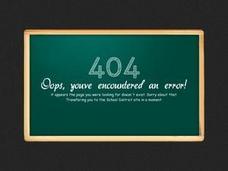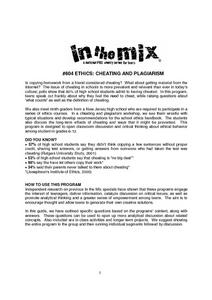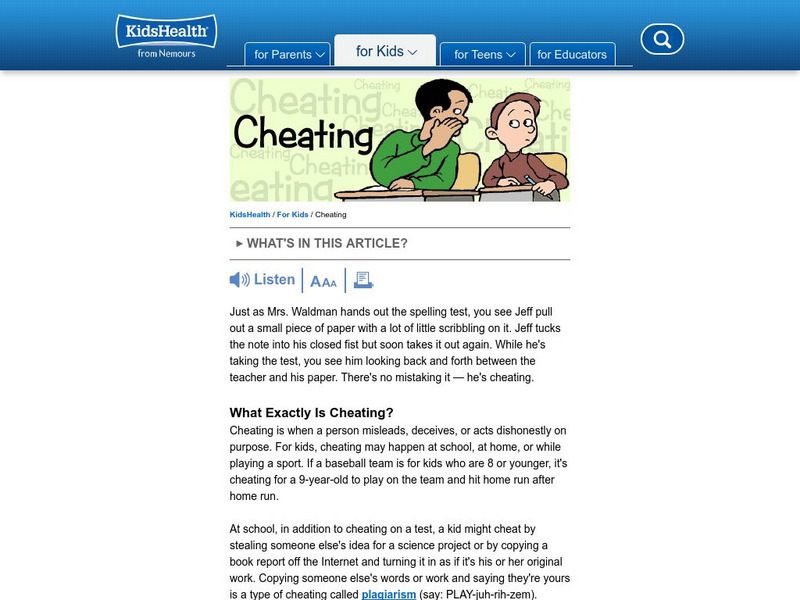Curated OER
Writing a Literary Analysis
What makes writing literary? What comprises analysis? A 15-slide PowerPoint presentation, created by the Purdue University Writing Lab, tackles these questions. The explanations of what makes writing literary and what comprises analysis...
Curated OER
Documenting Sources: An Introduction to Incorporating and Documenting Outside Sources in Your Writing
Text heavy, the 16 slides in this presentation provide specific examples to introduce researchers to documenting outside sources in expository writing. A follow-up activity or worksheet would provide an opportunity for guided practice.
Curated OER
Please No Posers
How do you reference information correctly? Avoid plagiarism by accurately summarizing a New York Times article with your middle or high schoolers. Young researchers then insert properly attributed quotations and paraphrases into their...
Curated OER
Library Skills Review
Middle schoolers review library skills by rotating through teacher-created learning stations covering various topics. They discuss plagiarism, work on Almanac practice as a team, complete practice using indexes, and an abstracts handout...
Curated OER
Give Credit Where Credit is Due
Middle schoolers explain what plagiarism is, why it is a problem, and how to avoid it. They articulate why it is unacceptable in a research document, and they show how to avoid it by using proper citation tools. They demonstrate correct...
Curated OER
Sample Lesson on Taking Notes
Have your middle schoolers define the terms outline, summary, paraphrase, plagiarism, citation, reference, and bibliography. They identify the main ideas, topic sentence, supporting ideas in technical writing and create note cards using...
Curated OER
Plagiarism
Transform this short, bulleted list into a true or false questionnaire for your young researchers. Most kids aren't even sure if they're plagiarizing, so help them really understand what it means before assigning them a research...
Curated OER
Plagiarism in the Real World
How would you feel if someone plagiarized your work? After class members turn in an assigned newspaper article, you rewrite the piece using elements of their writing. Then you claim you will be selling the story and that you will profit...
Curated OER
Conducting Research
"Conducting Research" is a short presentation that walks secondary students through steps for researching. Plagiarism, style, citing, and creating bibliographies are overviewed. While this is a short slide show, it would be useful to add...
Curated OER
Honoring Property Rights
Students examine the issue of cheating. In this property rights lesson, students define honor and discuss intellectual property rights as they explore a case study.
Curated OER
Language Arts: Quotation Marks Practice
After reviewing the eight rules for using quotation marks, class members complete worksheets as independent practice and review how these punctuation marks change the meaning of a sentence. Additional worksheets are provided for homework.
Curated OER
Plagiarism Activity Worksheet
In this plagiarism activity learning exercise, students read two articles and identify quotations and paraphrases that constitute plagiarism. Students write "plagiarism" or "okay" beside each quote or paraphrase.
Curated OER
Cheating Hurts
Students make a list in groups of why cheating is wrong. In this cheating lesson plan, students make a list and discuss their lists with the whole class.
Curated OER
Parenting Challenges
For this career worksheet, students identify and describe what challenges are the most difficult for parents to deal with today. Then they identify and describe what they think the most difficult challenges will be when they become parents.
Curated OER
Are Exams a Waste of Time?
In this test taking strategies worksheet, students, with a partner, to discuss and complete a variety of questions associated with exams and an English test.
Curated OER
Take Note!
Students take notes on information they find on the Internet or from other sources. They determine how to avoid plagiarism when gathering information needed. They discuss basic issues and consequences relating to responsible use of...
Curated OER
Understanding Plagiarism Workshop Lesson Plan
High schoolers define the term plagiarism, they recognize plagiarism and are able to explain what constitutes appropriate use of others' words and ideas. Pupils are explained the notion of plagiarism such as: taking another's ideas is...
Curated OER
The "Write" Stuff: Third Grade Strategies and Conventions
Students analyze the writing process through the ten lessons of this unit. The expository lessons address topic and detail sentences, paragraph organization and development, note taking, reports and letter writing.
Curated OER
No Plagiarism, Please!
Third graders listen to a lecture on how to take notes and discuss the skills of paraphrasing and correctly citing resources. They prepare note cards according to the format presented in class.
Curated OER
On Being Modern Knight
Students, upon completion of the "Knighting Ceremony" and reflection, research the meaning of privacy, plagiarism, pirating, computer viruses, or hacking. Then they design a survey of high school students to find the level of acceptance...
Curated OER
Ethics: Cheating and Plagiarism
Learners examine the reasons why students cheat and plagiarize material. They discuss what could have been done to avoid cheating and copying material. They answer questions to end the lesson.
Curated OER
Kids Health: Cheating
Have you ever noticed a classmate's eyes wandering to another students paper during a test? Have you ever been tempted to peek at the answers on another person's test? This article tells you how to handle cheating, inside and outside the...
Science Buddies
Science Buddies: The Physics of Cheating in Baseball
This week-long project asks you to examine the density of certain materials, such as "corked" baseball bats and regular baseball bats, and whether they can cause a ball to travel different distances.
NPR: National Public Radio
Npr: Lying, Cheating, Stealing
A four part NPR series on contemporary ethics, one part talks starts with whether one should eat a grape in the supermarket without paying for it, and then expands the topic. The second part is corporation/business ethics. The third is...







